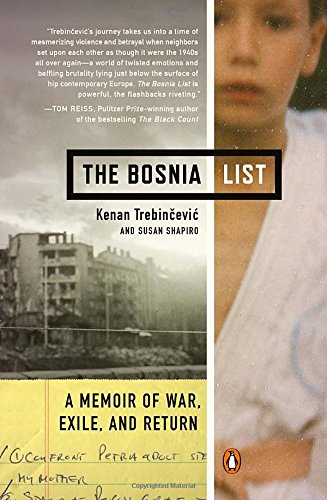
The Bosnia List
A Memoir of War, Exile, and Return
کتاب های مرتبط
- اطلاعات
- نقد و بررسی
- دیدگاه کاربران
نقد و بررسی

December 16, 2013
Nearly 20 years after fleeing their war-ravaged country with his parents and older brother (“the last Muslim family in town”), Trebincevic returned to his hometown of Brcko, Bosnia with vengeance in his heart, yet he found there a different kind of reckoning. In this astute account, co-authored with Shapiro (Five Men Who Broke My Heart), is readably organized and evenhanded. Trebincevic alternates narrating his admittedly reluctant journey back to Bosnia with his father, now in his 70s, and brother, Eldin, in July 2011, with his reconstruction of the outbreak of war in March 1992—when the author was 11, Bosnia-Herzegovina had declared its independence from Yugoslavia, and the well-armed Serbs launched a bloody campaign of “ethnic cleansing” against the majority Muslims in the country. Trebincevic and his family were blindsided by the violence, since the diverse ethnic groups had lived in harmony for decades, yet seemingly overnight had to contend with neighbors and teachers hurling ethnic slurs. The family eventually escaped to Connecticut, yet the bonds of loyalty and treachery were so complex and scarring that even after having made his career as a successful physical therapist in Queens, N.Y., Trebincevic, now 30, wrote out a list of scores to settle when he agreed to accompany his father and brother back to their hometown. The great instruction of this important work is the author’s moral transformation that helped him replace hate with grace, if not forgiveness.

January 1, 2014
With the assistance of Shapiro (Journalism/The New School; Unhooked: How to Quit Anything, 2012, etc.), Trebincevic returns to the scene of childhood trauma during the Bosnian War of the early 1990s. The author fled the bloody civil war in his native Bosnia in 1993 with his father, mother and older brother, Eldin, and settled in Connecticut. Just 11 years old when the war broke out, the author observed the sudden hostility of the Serbs toward him and his family, native Muslims, as ethnic tensions flared in their diverse town of Brcko and the Muslims were persecuted in the name of Serbian supremacy. His revered karate coach turned a cold shoulder to him, the family's bank account was depleted, his favorite teacher spat at him on the street ("Everything he'd ever taught me about brotherhood and unity was a lie"), the shopkeepers taunted them, and, most haunting for the boy who could not protect his mother, their neighbor, Petra, gradually appropriated their furnishings and clothes since, as she assured his mother, "You won't be needing that carpet." When the author's father, now in his 70s, a widower since his wife died of cancer, resolved to return to Bosnia in 2011 for a visit, the author and his brother had to swallow their pride and go with him, with enormous trepidation. At 30, the author was "startled by the intensity of [his] fury" when imagining how he would return to his tormentors. Indeed, he drew up a list of grievances to attend to during his visit, including confronting Serb classmates and friends who had turned the family in, especially Petra; peeing on the karate instructor's grave; and visiting the concentration camp where his father and brother were imprisoned. Yet immersion in his homeland and being bombarded by the new reality challenged his vendetta in surprising ways. An engaging memoir of war trauma and the redemption to be found in confronting it.
COPYRIGHT(2014) Kirkus Reviews, ALL RIGHTS RESERVED.

April 1, 2014
Yugoslavia's descent into war and genocide more than two decades ago has been the subject of outstanding scholarship, journalism, and biography. Trebinčevic's account contributes to this literature in an unusual way. The author blends his childhood experience of Bosnia's tragedy with a return to his original home in Brčko after nearly 20 years in the United States. The titular list is of goals the author intends to accomplish. They include seeking out surviving friends and relatives as well as confronting Serbs guilty of crimes against Trebinčevic's defenseless Muslim family. The great irony of the narrative consists in the list's gradual transformation into an enumeration of Serbs who rendered critical help, enabling the family's survival and flight. Far from being a tale of exoneration, the author's story is one that reveals the power and limitations of memory, the poignant complexity of human relations in battle, and the catharsis of understanding past betrayal and sacrifice. VERDICT Combining themes of war, childhood, and return, this memoir is for readers interested in the human drama of brutal conflicts and social dislocation. Knowledge of Balkan history is not necessary.--Zachary Irwin, Behrend Coll., Penn State Erie
Copyright 2014 Library Journal, LLC Used with permission.

December 1, 2013
When Trebincevic was 12, he fled with his family from their small town in the former Yugoslavia, driven out at the threat of death by the ethnic cleansing of Muslims. His childhood buddies, even his beloved karate coach, turned against him. His father and older brother were briefly imprisoned in a concentration camp. The neighbors slowly stole precious items from his mother. From the safety of adulthood in the U.S., Trebincevic is reluctantly drawn back to his homeland when his aging father longs to return for a visit. If he must go back, he wants some revenge and some closure. On his agenda: confront his neighbor, stand on the grave of his former coach, leave flowers at his grandmother's grave. Trebincevic alternates memories of his childhood and of his life in the U.S. with its edgy attempts to get along with Serbian Americans. In Bosnia, he faces the jarring complexities of people, including himself, coping with atrocities as he finally begins to put away old resentments that have haunted him. A mesmerizing story of survival and healing.(Reprinted with permission of Booklist, copyright 2013, American Library Association.)

























دیدگاه کاربران